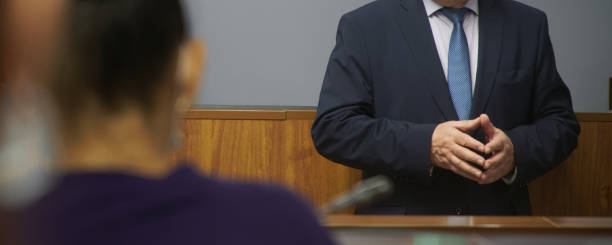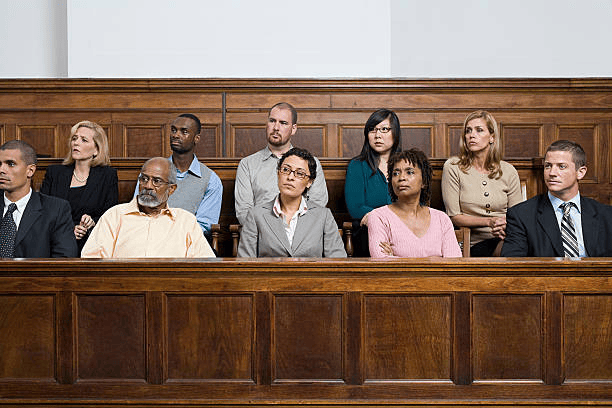Who is a juror NSW? Jurors are randomly selected from a jury roll which is based on information provided by the Australian Electoral Commission (AEC). Thus, if you are a voter, you can serve as a juror.
In Criminal Law proceedings, there are usually 12 jurors in the trial. The jury must come to a unanimous decision. However, if this is not possible, a majority verdict of 11 out of 12 jurors may be accepted. If the jury cannot reach a majority verdict, a retrial may occur.
This article discusses being a juror NSW, as well as the obligations, responsibilities, and prohibitions of such.
Is Being a Juror NSW Mandatory?
Yes, jury duty is mandatory. If you do not report to court, you may be fined up to $2,200. However, you may be excluded or excused from jury duties under several grounds (discussed below).
Obligations as a Juror NSW
Jurors are the trier of the facts, thus, they can decide what factual evidence to accept and what to reject. They also have the power to determine whether a witness’ statement is reliable or not. Jurors hear the evidence and apply the law to the facts of the case to determine whether the defendant is guilty or not.
Furthermore, members of the jury must take an oath or affirmation that they will give a true verdict according to the evidence. Thus, they would have to consider the evidence fairly and without bias. The verdict must be based on the evidence presented in the trial.
Juror NSW Prohibitions
Here are things a jury member must not do:
- A juror should not disclose jury deliberations.
The law prohibits members of the jury from disclosing information about how the jury came up to a decision. Such a violation can result in a fine of $2,200.
- A juror should not make an enquiry outside the courtroom.
The law prohibits jurors from making enquiries outside the courtroom. They must not try to gain additional information about the defendant or any other matters relating to the trial, except when in the proper exercise of their duty.
Jurors must only consider evidence presented in the courtroom. This prohibition includes researching about the defendant, going to the scene of the crime to obtain more information, or conducting experiments.
This prohibition ensures that the jury remains impartial when making a decision. The verdict must be based solely on the evidence presented in court, and not from what they hear outside the courtroom.
Making further enquiries outside the courtroom is a criminal offence under the Jury Act. The maximum penalty for such offence is 2 years’ imprisonment, and/or a fine of up to $5,500.
Under Section 68C, making an enquiry includes the following:
- asking a question to any person,
- conducting any research, for example, by searching an electronic database for information (such as by using the Internet),
- viewing or inspecting any place or object,
- conducting an experiment,
- causing someone else to make an inquiry.

Reporting Jury Misconduct
The law allows jurors to report any suspected misconduct or irregularity of fellow members of the jury. Under Section 75C, “irregularities” include:
- the commission by the juror of an offence under this Act or any other misconduct,
- a juror becoming excluded from jury service,
- the refusal of the juror to take part in the jury’s deliberations,
- the juror’s lack of capacity to take part in the trial or coronial inquest (including an inability to speak or comprehend English),
- the juror’s inability to be impartial because of the juror’s familiarity with the witnesses, parties or legal representatives in the trial or coronial inquest, any reasonable apprehension of bias or conflict of interest on the part of the juror, or any similar reason.
Responsibilities of an Employer of a Juror NSW
Jury duty, also known as jury service, is a type of community service leave. Employees, including casual employees, can take leave to attend jury selection and jury duty. However, the employee needs to provide evidence showing they attended jury selection or jury duty.
Furthermore, your employer must release you for jury service, otherwise, they may face penalties. Employers may face severe penalties if they fire you because of your absence for attending jury service. Furthermore, your employer cannot force you to take accrued holidays or sick leave to attend court for jury selection.
Juror NSW Exclusions
A person can be excluded from serving on a jury if they:
- Have been convicted of certain serious offences,
- Have served a term of imprisonment within the last seven to ten years,
- Have been found guilty of an offence and detained in a detention centre or juvenile facility in the past three years,
- Are currently bound by a court order relating to a charge or conviction (such as parole, community service order, apprehended violence order (AVO), good behaviour bond, bail or remand, or an order disqualifying the person from driving), and
- Are employed in public service, law enforcement, criminal investigation, the provision of legal services, or the administration of justice.
Juror NSW Exemptions
A person can claim an exemption from jury duty if they:
- Are a practising dentist, pharmacist, or medical practitioner,
- Are part of the clergy,
- Are employed or engaged in emergency services provision,
- Care for children or others who have a mental or physical impairment,
- Are a sole trader or contractor,
- Medical needs enabling absence and inability to attend,
- Served as a juror in the past three years, or attended court when required for jury duty (but did not serve) in the last 12 months, and
- Have study commitments that are unable to be missed.
Exclusions and exemptions are decided on a case-to-case basis. It must be applied for by the person and that person must show supporting documents as to why they must be excused from jury duty.

Seeking Legal Advice
Perhaps you have receive a summons for jury duty but are facing some complications. Or perhaps you wish to apply for an exclusion or exemption to being a juror NSW.
JB Solicitors has a leading team of lawyers who can help with your case. We provide legal advice tailored to your needs. We also ensure that our client’s legal matters are resolved.
Do you have any more queries on juror NSW? Contact us today.
